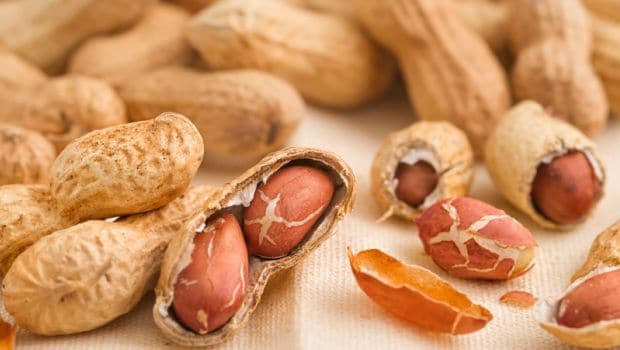Peanuts for weight loss: Rujuta Diwekar recently took to Instagram to share the various health benefits of peanuts and how they are beneficial for people suffering from diabetes, Polycystic Ovarian Disease (PCOD), etc.

Peanuts can be helpful in increasing satiety and preventing weight gain
HIGHLIGHTS
- Peanuts are good for people with diabetes
- They can be helpful for women suffering from PCOD
- Peanuts are good for heart health
Peanuts or groundnuts are a kind of nuts which originate in South America. They are also known as earth nuts. Peanuts are technically not nuts. They actually belong to the legume family and are related to lentils, beans and soy. Celebrity nutritionist Rujuta Diwekar is of the belief that peanuts are super legumes and you must include them in your diet. She recently took to Instagram to share the various health benefits of boiled peanuts and how they are beneficial for people suffering from diabetes, Polycystic Ovarian Disease (PCOD), etc. Peanuts can either be consumed raw or in the form of peanut butter, peanut oil, etc. Apart from being tasty, peanuts are also nutritious and are rich in fat, protein and various other nutrients essential for good health. They help in inducing weight loss and reduce risk of cardiovascular diseases.

Peanuts are good for heart health
Photo Credit: iStock
In her Instagram post, Rujuta writes that peanuts are good for people with diabetes. They help in reducing leg pains and night cramps, all thanks to their mineral and Vitamin B content. Peanuts are also helpful in regulating blood sugar.
Also read: Are Cashew Nuts Good For You? Know The Health Benefits Of Cashews
Speaking of heart disease, peanuts are especially helpful in keeping heart disease at bay as they contain essential fatty acids like reservatol. Reservatol and many other antioxidants in peanuts prevent damage caused by free radicals in the body and are thus good for heart health.
Coming over to women suffering from PCOD, peanuts contain compounds like biotin and Vitamin B1 and Vitamin B6. These compounds help in reducing bloating, and irritable and disturbing symptoms of PMS. Including peanuts in your diet can also help in preventing acne and hair loss, which are common risk factors of PCOD - a hormonal disorder which is characterized by irregular periods, acne and facial hair.
Also read: Here's How Many Nuts And Seeds You Should Have For A Healthy Heart
Peanuts are also healthy for teenagers. They are rich in protein and are full of micornutrients. Groundnuts are easily available and make for a quick and inexpensive snack. They keep mood swings - which are quite a common occurrence among teenagers - at bay.
What's more is that peanuts are also helpful during pregnancy. Expecting mothers can benefit from eating ground nuts as they help improving diversity in gut bacteria. They help babies fight infections and allergies and make intolerances better.

Peanuts can help in inducing weight loss by increasing satiety
Photo Credit: iStock
Peanuts for weight loss
Despite their high fat and calorie content, peanuts do not contribute to weight gain. Peanuts can in fact promote weight loss as they promote satiety. High levels of protein and monounsaturated fat in peanuts help in increasing energy expenditure. Also, peanuts are rich insoluble dietary fibre which reduces risk of weight gain.
Also read: Tiger Nuts: Weight Loss, Anti-Ageing And Many More Health Benefits
Peanuts prevent gallstones
Gallstones are referred to the hardened deposits of bile that form in your gallbladder. Bile is a digestive fluid which is produced in liver and is stored in your gallbladder. Studies suggest that gall stones mostly contain cholesterol. Peanuts have cholesterol lowering properties which can help in prevention of gallstones.
However, peanut consumption can also have a few adverse effects as well. Read below to know about them:
Peanut anti-nutrients
Peanuts contain a number of anti-nutrients, which are substances that affect absorption of nutrients and reduce nutritional value. Phytic acid is the antinutrient in peanuts which must be taken note of. These phytic acids can impair absorption of iron and zinc from the digestive tract. Consuming peanuts in excess can cause deficiencies in minerals over a period of time.

Peanuts can prevent mood swings in teenagers
Photo Credit: iStock
Peanut allergy
Peanut allergy is quite a common food allergy. Peanut allergy can be quite severe and thus people who develop peanut allergies should completely refrain from eating them.
Aflatoxin Poisoning
Sometimes, peanuts can be contaminated with a species of mold, which produces a toxic substance known as aflatoxin. This kind of poisoning can cause yellow discoloration of eyes or jaundice, signs of liver problems and loss of appetite. Risk of aflatoxin poisoning depends on the way peanuts are stored. The risks are higher in case peanuts are stored under warm and humid conditions. This kind of poisoning can be prevented by properly drying peanuts and keeping them cool places with lesser humidity.
Disclaimer: This content including advice provides generic information only. It is in no way a substitute for qualified medical opinion. Always consult a specialist or your own doctor for more information. NDTV does not claim responsibility for this information.
DoctorNDTV is the one stop site for all your health needs providing the most credible health information, health news and tips with expert advice on healthy living, diet plans, informative videos etc. You can get the most relevant and accurate info you need about health problems like diabetes, cancer, pregnancy, HIV and AIDS, weight loss and many other lifestyle diseases. We have a panel of over 350 experts who help us develop content by giving their valuable inputs and bringing to us the latest in the world of healthcare.














